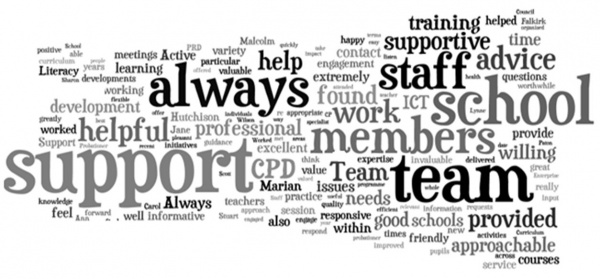Introduction
 Falkirk Council Education Services Curriculum Support and Quality Improvement is based at The Foundry and Sealock House. The remit of the team encompasses Continuing Professional Development, Curriculum Development 3-18, Workforce & Organisational Development, Professional Review and Development, Probationer Support, Digital Technologies, Health & Wellbeing, Library Support for Schools, and central support for work experience.
Falkirk Council Education Services Curriculum Support and Quality Improvement is based at The Foundry and Sealock House. The remit of the team encompasses Continuing Professional Development, Curriculum Development 3-18, Workforce & Organisational Development, Professional Review and Development, Probationer Support, Digital Technologies, Health & Wellbeing, Library Support for Schools, and central support for work experience.
The team supports the recommendations of Teaching Scotland’s Future – Report of a review of teacher education in Scotland (Graham Donaldson, December 2010) in contributing towards building the professional capacity of staff to ensure a positive impact on young people’s learning, supporting and strengthening leadership, promoting the highest standards of professional competence and commitment, working with partners to promote the delivery of career-long teacher education, developing and sharing good practice across all educational establishments in Falkirk Council.
Overview of Support to schools provided by Falkirk Council Education Services Curriculum Support Team
The Curriculum Support Team:
- Provides a strategic lead for innovation and development.
- Demonstrates flexibility and creativity
- Provides credible and valuable encouragement and support
- Adds value to the quality of the service provided by educational establishments
- Communicates and collaborates effectively
- Builds and maintains quality relationships
- Develops and implements sustainable systems
- Influences practice and development and provides mechanisms for sharing practice
- Responds effectively to national/local/educational establishment priorities
- Co-ordinates, develops and leads Continuing Professional Development opportunities related to authority and educational establishment priorities
- Undertakes regular validated self-evaluation
Members of the Curriculum Support team:
- provide face-to-face professional dialogue, and respond to requests for advice by telephone and email from colleagues across all sectors of the education services
- contribute to working parties, focus groups, networks and curriculum management groups, bringing their experience of working in and with educational establishments to focus on developing practices for learners
- provide one-to-one support for colleagues across all sectors of the education services
- contribute to the research and preparations for guidance documentation in consultations with colleagues in educational establishments & nationally
- research and evaluate resources to meet identified needs of educational establishments and undertake the required procurement processes
- support educational establishments in complying with legislation, and local and national guidance, in the delivery of learning and teaching experiences and outcomes
- support and encourage educational establishments in meeting the requirements of local and national awards, competitions and accreditation schemes
- work in partnership with educational establishments and others in adding value to validated self evaluation
- liaise with other agencies to improve outcomes for learners
- co-ordinate the deployment of authority-wide resources within educational establishments
- organise, co-ordinate and support authority-wide events and activities
- develop, co-ordinate, maintain and promote online spaces for sharing resources and practice, and for collaboration within and across educational establishments locally and nationally
- provide continuing professional development within educational establishments and centrally
Meet the team members
You can find out about each individual member of the Curriculum Support Team on the Meet the Team page.
How do we measure impact and effectiveness?
As a service we measure the impact of our work and its effectiveness in a number of ways, including questionnaires, validation visits, scrutiny visits, QIO evaluations, SMT qualitative feedback, professional dialogue, probationary teacher classroom observations, surveys, statistics of usage of Glow Groups, Blogs/website evidence, MIICE, and activity statistics.


